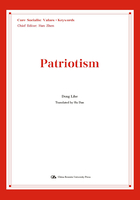
★Additional Information
Qu Yuan(approximately 340 B. C. —277 B. C. )from the Kingdom of Chu in the later period of the Warring States was an outstanding statesman and poet. Born a talent in a royal family, he was trusted by King Huai of Chu and was appointed to important posts. He actively promoted political reforms in order to realize his ideal of“beautiful politics”, and to eventually unify the whole China. Domestically he pushed King Huai of Chu to reform and“to promote talented people”. Externally he advocated“allying with the Kingdom of Qi and countering the Kingdom of Qin”and reclaiming the land occupied by Qin. But Qu's reform touched the interest of those corrupted royal groups. They plotted against him and defamed him before the King Huai of Chu. The King finally dismissed Qu and banished him to a remote area. During the Warring States period, the relationships between kingdoms were not fixed, and intellectuals and talented people did not have to serve their own kings. Many talented intellectuals might serve other kingdoms if they were not put into important positions. For instance, Shang Yang deserted the Kingdom of Wei and served Qin. Mencius gave his advice to the kingdoms of Qi and Liang. Xuncius went to serve Qin and Chu. And Han Fei departed Han to assist Qin. However, when Qu Yuan was banished, he had only the wellbeing of his own country in heart. His millennia-lasting patriotic poetry Li Sao was best proof. In it he wrote, “I am eagerly looking forward to serving my own country. But it's a long, long way to come. ”“Thinking of so many of my countrymen suffering, I cannot help but crying. ”All those words demonstrated Qu Yuan's strong sense of national belonging and profound patriotism. In 278 B. C. , Qin attacked Chu and occupied one town after another. At this Qu Yuan was profoundly saddened, but he could do nothing about it. In despair, on May 5 that year, he threw himself into the Miluojiang River.
At the very beginning, the Chinese tradition of patriotism was conceived in the conflicts and integration between the two big tribes of Emperor Yan and of Emperor Huang. After the two tribes were merged, the people lived in peace and harmony during the times of Emperor Yao and Emperor Shun. Shun ordered Yu to contain the then frequent floods. Yu did it with great success. Yu then succeeded Shun as emperor and became known as Yu, the Great, who established the first dynasty of China, the Xia Dynasty. After that, the concepts of virtue, loving one's own country, the people and the nation gradually evolved and deepened.
The Confucius, Mohist, Taoist and Legalists during the Spring and Autumn Period and the Warring States Period were all based on the idea of“governing the nation”for a peaceful existence and a harmonious society. For the good of the society, most scholars from those schools would travel constantly from country to country in the hope of turning an unprincipled society into a wel-l governed world. During that period, many society-conscientious, kingdom loyal scholars or gentlemen emerged, who advocated a speedy end of the situation where different kingdoms fought each other for power and the establishment of a united large feudal empire.